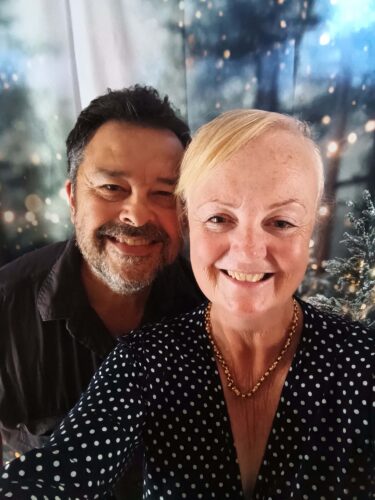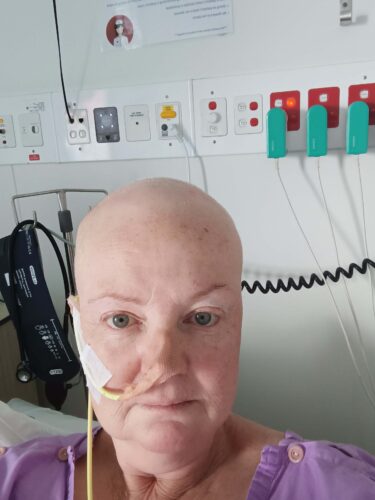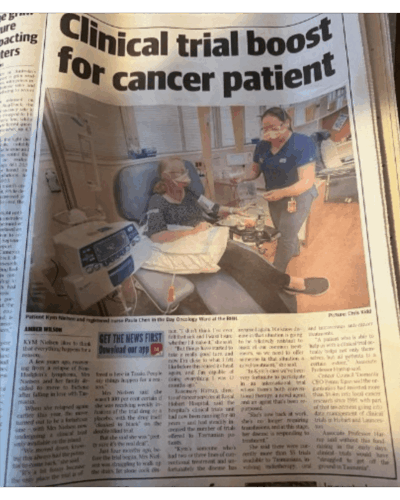Kym’s Triumph: Overcoming Lymphoma and Embracing Remission
In 2018, Kym Nielsen was living what seemed like a normal life, working hard, raising her family, and managing a small business. But a routine blood test revealed something unexpected: she had Non-Hodgkin Lymphoma (NHL). What started as a lump at the base of her skull led to a diagnosis that would change her life forever.
“I had been to my GP with a lump at the base of my skull, but was told it was probably only a cyst,” Kym recalls. After a biopsy, she started her first round of chemotherapy, R-CHOP. “I was undergoing chemo while managing my family and running a business,” she says. It was tough, but Kym was determined to push through.
Throughout her treatment, Kym experienced the normal side effects of chemotherapy. “No real symptoms. Just tired, but I put this down to working seven days a week,” she explains. Despite the fatigue, Kym remained incredibly active. “The second time I was diagnosed, I was the fittest I had ever been. I was running daily and going to the gym once, sometimes twice a day.” She learnt to predict her worst days and worked around them. “I managed to keep my routine as best as I could, even though it wasn’t easy.”
In December 2019, her family made a big move from New South Wales to Tasmania. Kym stayed behind to sell the business, but soon, another curveball hit, her cancer returned. “In April 2020, I discovered my cancer had returned, and COVID arrived. My husband and son were in Tasmania, and I was stuck in NSW undergoing chemotherapy again with a plan for a bone marrow transplant (BMT).”
Kym’s battle was far from over. She began the process of preparing for a bone marrow transplant (BMT), but there were challenges in getting the procedure done. Kym had to travel to two different states for treatment. Kym’s bone marrow was harvested in Queensland, but due to state border closures from Covid restrictions, there was uncertainty about whether she could cross into Queensland for the transplant. Despite the challenges, Kym made it, isolating in hospital during the procedure. Afterward, she returned to New South Wales to recuperate, but the state borders were still closed, so she couldn’t join her family in Tasmania immediately. Once the borders reopened Kym was booked onto the first plane to Tassie to join her family.
Despite these hurdles, Kym remained hopeful. “I was in remission,” she says, but the relief was short-lived. In March 2021, the cancer returned once again, and Kym started another round of chemotherapy. While in Launceston, Kym questioned her doctor for not having a clear plan. “That was when I was offered a place on an international clinical trial based in Hobart,” Kym recalls. “It was a huge relief, and it led to an opportunity I hadn’t expected.”
Then, in July 2023, Kym had another BMT, this time using her sister as a donor in Brisbane. After 100 days, Kym returned to Tasmania, where, on January 27th, 2025, she received the news that she was officially in full remission. It was a moment of immense relief and joy.
Throughout the difficult times, Kym found ways to manage, even when the physical and emotional toll was overwhelming. “I learned to predict my worst days and worked around them. That way, I could still keep doing things and stay as active as possible,” Kym reflects.
Throughout her treatment, Kym’s biggest stressor wasn’t physical, but financial. “I was unable to access any financial assistance via Centrelink, and my husband and I have a small business, so a lot of pressure was placed on him,” she says. “He couldn’t visit me while I was in Brisbane because if he didn’t work, there would be no money coming in. I was fortunate to have my accommodation covered by the Cancer Council.”
Despite the hardships, Kym was grateful for the support she received from loved ones. Her family was by her side, and her mother was especially helpful during her recovery from the last BMT. “My family was great. They helped out in so many ways,” she says.
In terms of accessing support, Kym found it invaluable, especially during her final transplant. “I was assigned a counsellor, which was a huge help,” she recalls. She also accessed several of Lymphoma Australia’s resources, including their NHL and BMT booklets and online webinars, which offered much-needed information and connection.
Now that Kym is in remission, she has some powerful advice for others:
“Ask for help and take help when offered. You don’t get brownie points for doing it alone.”
Kym’s story is a true testament to the strength of the human spirit and the importance of resilience. Her battle wasn’t easy, but through it all, she kept pushing forward, staying focused on what was ahead.
Today, she’s embracing remission and sharing her story to help others facing similar challenges.